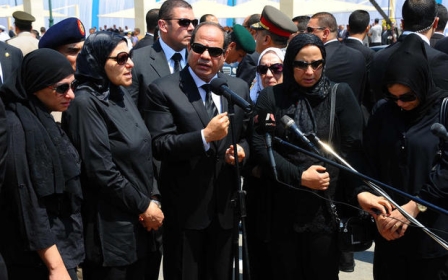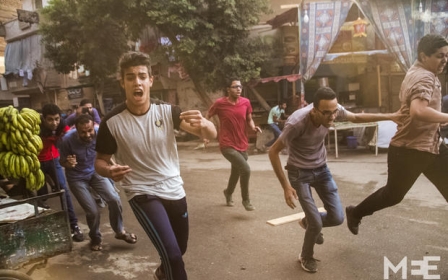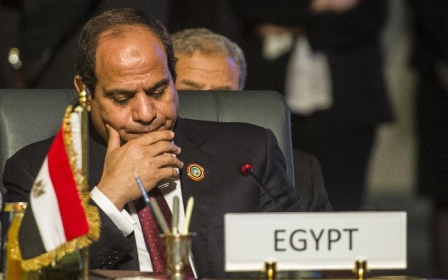Egypt's Sisi nominated for Nobel Peace Prize by fake UN agency

A pro-government website in Egypt has stirred controversy with reports that President Abdel Fatah al-Sisi has been nominated for the 2015 Nobel Peace Prize.
According to the Cairo Post, the United Nations Organisation for Arts (UNARTS) office in the Middle East said in a statement issued on Wednesday that it had selected Sisi as a nominee “for his efforts in spreading peace, saving from Egyptians from imminent danger in 30 June”.
On 30 June 2013, mass protests led to the military deposition of former president Mohamed Morsi from the now banned Muslim Brotherhood.
A statement released by the UNARTS office for Africa Middle East, quoted by the Cairo Post, praised Sisi for combating terrorism and corruption and said that the nomination was submitted to the Norwegian Nobel Peace Prize committee in Stockholm.
“Based on his insight on best ways to fight terrorism globally, his concern for humanitarian issues including supporting people of special needs and fighting corruption, President Sisi is a well-deserved nominee for the 2015 Nobel Peace Prize,” the statement said.
UNARTS describes itself as part of the United Nations, founded in 2014 in California. The body includes artists and innovators from all over the world, with a goal to "build a society which texture is based on freedom and peaceful coexistence among humans".
Middle East Eye contacted the UNARTS United States office, but could not obtain further information regarding Sisi's reported nomination.
However, investigation by the Arabic news website Arabi21 discovered that it is not an official organisation and has nothing to do with the United Nations.
The head of the organization, an Egyptian Copt called Nabil Rizk, identified himself as the regional director for the Middle East and Africa office.
Rizk is an Egyptian artist who in the aftermath of the January 2011 uprising established a union for artists called the Arts Profession Syndicate. The syndicate was unsuccessful in obtaining government authorisation to function legitimately.
Rizk then proceeded fell out with the heads of the three main art unions- the acting, cinematic and musical guilds - after they sued him in court under the accusation of defamation.
The Nobel committee told MEE on Thursday that all nominee details been kept secret for 50 years and that it could not comment on individual nominations, even if the nominator choose to make the nomination public.
According to the Nobel Foundation, all nominations for the 2015 Nobel Peace Prize had to be made before 31 January, 2015. Any nominations made after that date would be considered for next year's Nobel Prize award.
The Nobel Committee says it has received 276 candidates for the Nobel Peace Prize for 2015 - the second highest number ever. Of this, 49 of these are organisations, and 227 are individuals.
Known candidates include Saudi blogger Raif Badawi, who was sentenced to 10 years in prison and 1,000 lashes in January, and Edward Snowden, the US whistle-blower.
Last year, the Nobel Peace Prize 2014 was awarded jointly to Pakistani education activist Malala Yousafzai and Indian child rights campaigner Kailash Satyarthi “for their struggle against the suppression of children and young people and for the right of all children to education”.
The last Egyptian leader to receive the Nobel Prize was former president Anwar Sadat, who was jointly awarded the prize with then Israeli prime minister Menachem Begin shortly after signing the Camp David peace treaty in September 1978.
According to Alfred Nobel’s will, the Peace Prize is to go to whoever “shall have done the most or the best work for fraternity between nations, for the abolition or reduction of standing armies and for the holding and promotion of peace congresses”.
The prize includes a medal, a personal diploma, and a large sum of prize money, currently more than $900,000.
Sisi played a key role in the July 2013 overthrow of Egypt’s first democratically elected President Mohamed Morsi. He came to power officially as president a year later, and has since been criticised by many human rights organisations for his crackdown on opposition movements and human rights.
Since Morsi’s overthrow, according to Human Rights Watch more than a thousand people have been killed, and tens of thousands more arrested. Some have been forcibly disappeared, with journalists, students, dissidents, and Muslim Brotherhood supporters being singled out.
According to a report released this summer by Human Rights Watch, Egyptian authorities detained, charged or sentenced at least 41,000 people between July 2013 and May 2014, with prisons at 160 percent capacity and police stations at 300 percent. Torture of prisoners is also common, the watchdog said.
New MEE newsletter: Jerusalem Dispatch
Sign up to get the latest insights and analysis on Israel-Palestine, alongside Turkey Unpacked and other MEE newsletters
Middle East Eye delivers independent and unrivalled coverage and analysis of the Middle East, North Africa and beyond. To learn more about republishing this content and the associated fees, please fill out this form. More about MEE can be found here.





